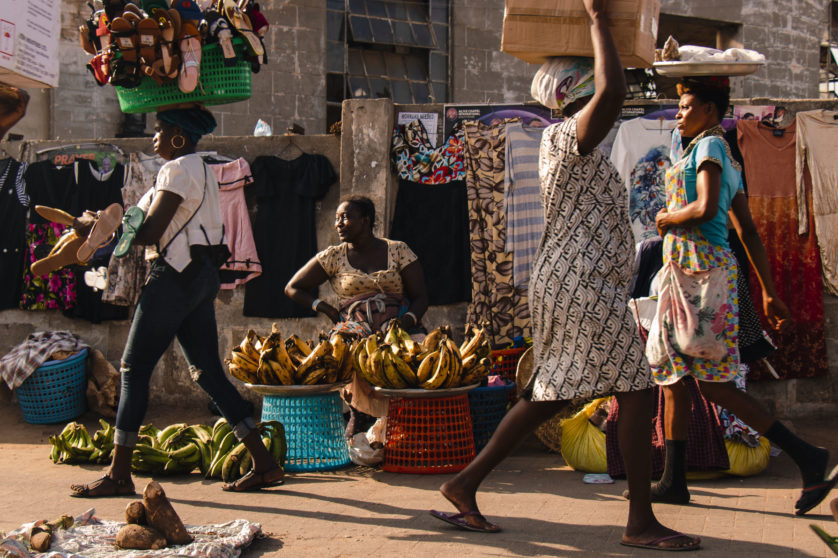The Electronic Transaction Levy (E-levy), a 1.5% tax on all electronic transactions, went into effect on the 1st of May amongst considerable uncertainty and controversy. One of the prime justifications for the levy was to capture the informal sector. The President of Ghana, Nana Akufo-Addo, defended the levy as an important measure to expand the tax base as part of the Ghana Beyond Aid Agenda. As he stated: “We cannot continue to allow less than ten percent of the population carry the direct tax burden of 30.8 million people. We must provide an opportunity for every Ghanaian to contribute towards nation building… [and] ensure that the hidden, submerged or informal economy is brought within the remit of the formal economy.”
But will the e-levy be effective in capturing the informal economy, and what impact will this have on youth and the vulnerable?
Raising revenue while protecting the vulnerable?
The E-levy has the potential to raise considerable revenue: Digital transactions in Ghana have increased rapidly as a result of the recently ended Covid-19 restrictions and the accompanying growth of digital transactions. In fact, Ghana is one of the fastest growing mobile money markets in Africa, with 47.3 million registered accounts and 18.4 million active users. According to the Finance Minister, the country’s total digital transactions for 2020 were estimated to be over GH¢500 billion (about US$62 billion). Based on this, the government is projecting to rake in tax revenue of about $900 million this year to finance infrastructure development and social spending.
The E-levy is applied to transactions including mobile money payments, bank transfers, and unregistered merchant payments. The E-levy is borne by the sender of transactions and is waived for transactions that amount to GH¢100 ($13) or less in a day. This threshold was put in place to protect the vulnerable and to avoid delaying the drive for financial inclusion. As the Minister of State Charles Adu Boahen said, “We did some surveys and analysis and realised that about 40 percent of transfers are below GH¢100, so … we believe that, by far, it takes care of the vulnerable in society.” Nevertheless, there are still several potential adverse impacts the E-levy will have for informal sector workers.
Undermining pandemic recovery?
In Ghana, informal employment represents 89% of employment nationally, and informal workers are yet to recover from the adverse effects of Covid-19. Further, women outnumber men in informal employment in Ghana, at 92%, compared to 86% of men. These women tend to be clustered in the lesser renumerated forms of informal work, including petty trading and hawking. Low capital, compounded by the social relations that relegate unpaid family responsibility to women, render them particularly vulnerable group.
Last month, Ghana’s inflation rate jumped to the highest level the country has seen in 18 years, and food costs climbed 30% from the year before. For workers in the informal sector, the E-levy could represent yet another obstacle in the struggle to revive their livelihoods.
Comfort Ankrah, for example, has relied on mobile money transfers for the past eight years to run her grocery shop in Accra, using it to pay the farmers who supply her and take payments from customers. She earns about GH¢400 ($53) weekly, and the levy is forcing her back to using cash. As she said “I can’t afford to pay my farmers with mobile money now because the e-levy will reduce my profit. I now resort to giving money to drivers or relatives going to the village so they can pay the farmers. It’s a risky, long process.”
Making saving harder
Most informal sector workers belong to the micro small and medium enterprises and have very minimal purchasing power, and therefore a poor savings culture. Most of these workers do not have bank accounts but do have mobile money accounts. With the implementation of the E-Levy, informal workers may be tempted to keep their earnings in cash rather than in their mobile money wallets. Indeed, the central bank reported that the mobile money industry lost over $1bn in the two months from last November as people switched to cash ahead of the tax coming into force. Since saving cash in hand is more difficult than saving in an electronic medium, it is likely to have a negative impact on savings.
Limiting informal workers’ growth potential
Another potential effect of the E-levy is a reduction in market innovation and investment in other trading ventures. Informal market traders tend to sell seasonal goods and invest in items that they perceive to be profitable in the season. Profit margins are small, and the implementation of the E-levy could increase operation costs and discourage people from investing further if they misunderstand and nurse the fear of any additional returns being taxed.
Moreover, the Covid-19 restrictions caused a surge is online marketing: Traders could send their goods through delivery bikers who were paid upon delivery by patrons while the sellers were paid through mobile money. With the introduction of the E-levy, these traders most of whom were previously unemployed youth, will possibly lose patronage as buyers may refuse to pay extra money for products that they can buy in person in shops instead.
Mobile money agents, many of whom were also hitherto unemployed youth, are also in peril if mobile money patronage should decline. James Mawuli for example, who works as a mobile money vendor in Accra, said he had already lost many customers, that transactions had reduced, and he feared he would lose his job.
Insufficient stakeholder engagement
The implementation of the E-levy also left much to be desired, with a significant lack of clarity and many misunderstanding and initial errors in its application. Stakeholders such as the Trades Union Congress in Accra decried the lack of consultation and communication, pointing to the prevalent misunderstanding of how the E-levy would work as a major issue. For example, the Director of the Zuuri Organic Farmers Association Philip Ayamba said that many people were not aware of the exemptions, and that this was causing them to massively withdraw cash from their mobile wallets and avoid using mobile money for fear of incurring charges.
The Institute of Statistical Social and Economic Research (ISSER) at the University of Ghana also deemed that the rate for the E-Levy was set too high. As the Director Professor Peter Quartey said, “The 1.5 per cent E-transaction levy rate is punitive and should be revised downwards to between 0.5 per cent and 0.75 per cent to allow more people to use the service and avoid eroding the gains made in digital financial inclusion.”
In conclusion, as the E-Levy has several potential negative impacts for vulnerable groups, the government should have made more effort to engage in consultation and dialogue to inform the policy, and ensure a better balance between the priorities of broadening the tax base and collecting more revenue, while promoting a digital economy accessible to all citizens.




